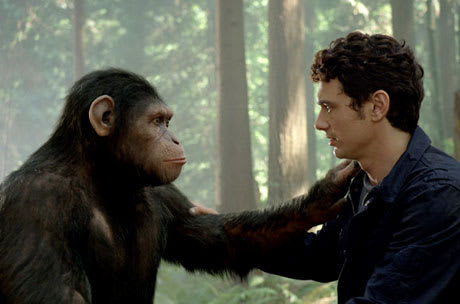Of the many possible parables and didactics that could have been injected into a Planet of the Apes origin story, it most likely wouldn't have occurred to me to make the entire thing a coy allegory for AIDS. But that's exactly what this origin story and ersatz franchise reboot is ― set in San Francisco and pivoting upon a viral cure for Alzheimer's that overrides the immune system, having a very different effect on apes than people.
Said virus heightens intelligence in chimpanzees, which is all sunshine and unicorns at first when creator Will Robson (James Franco) expands upon the medical implications of such a drug (think a slightly less enthused, but similarly motivated, Saffron Burrows from Deep Blue Sea). But this excitement is quickly diminished when the experiment seemingly backfires and all of the subjects are terminated, leaving Will to smuggle out a baby chimp to his Alzheimer's afflicted father, Charles (an awkwardly cartoonish John Lithgow).
This is ostensibly how the planet of the apes rises: the young chimp grows into adulthood feeling different from everyone else while being confused and conflicted by the harsh inconsistency and insanity of the supposed social order. It's a refreshingly humanist and thematically rich approach to sci-fi allegory that has been strangely absent from cinema for several decades.
Now, because this is an origin story setting up a franchise, there's a great deal of exposition and dry information doled out that often travels the road of cliché and caricature for the purposes of narrative efficiency. For example, when Caesar (the chimp) is taken to monkey prison, he's illogically harassed and tortured by two-dimensional caretaker Dodge (Tom Felton), whose motivation is secondary to the fact that we quickly need our apes to have a reason to fight against human injustice.
Fortunately, director Rupert Wyatt is hyper-aware of these shortcomings and compensates by flipping the film into hyper-drive, exploiting our ability to anticipate tropes by literally skipping over any and all filler and delivering the tedious nitty-gritty with utmost efficiency. He instead focuses his energy on extremely intense and impeccably constructed action sequences, a weirdly sinister tone and some surprisingly moving moments of character development with Caesar.
The end result is a little rushed and occasionally laughable, from a credulity perspective, but is also highly entertaining, riveting and far more intriguing than most mainstream fare. It's just a shame that the AIDS allegory wasn't taken a bit further, as a sex scene between Tyler Labine and a chimp would definitely make this big budget studio film stand out from the pack.
Rise of the Planet of the Apes screens at the TIFF Bell Lightbox as part of the Books, Science and Adaptations program on February 27th, 2013 at 7pm. Groundbreaking geneticist Dr. Scherer launches TIFF's this Science on Film series, and will consider how genetic engineering and bio-technologies are represented in the film. Also: Ontario Science Centre experts will be on hand to offer engaging demonstrations inspired by the themes explored in each film. For the Feb 27 launch, they'll be doing a cool interactive demo involving real primate skulls (gorilla, chimpanzee, orangutan, etc).
(Fox)Said virus heightens intelligence in chimpanzees, which is all sunshine and unicorns at first when creator Will Robson (James Franco) expands upon the medical implications of such a drug (think a slightly less enthused, but similarly motivated, Saffron Burrows from Deep Blue Sea). But this excitement is quickly diminished when the experiment seemingly backfires and all of the subjects are terminated, leaving Will to smuggle out a baby chimp to his Alzheimer's afflicted father, Charles (an awkwardly cartoonish John Lithgow).
This is ostensibly how the planet of the apes rises: the young chimp grows into adulthood feeling different from everyone else while being confused and conflicted by the harsh inconsistency and insanity of the supposed social order. It's a refreshingly humanist and thematically rich approach to sci-fi allegory that has been strangely absent from cinema for several decades.
Now, because this is an origin story setting up a franchise, there's a great deal of exposition and dry information doled out that often travels the road of cliché and caricature for the purposes of narrative efficiency. For example, when Caesar (the chimp) is taken to monkey prison, he's illogically harassed and tortured by two-dimensional caretaker Dodge (Tom Felton), whose motivation is secondary to the fact that we quickly need our apes to have a reason to fight against human injustice.
Fortunately, director Rupert Wyatt is hyper-aware of these shortcomings and compensates by flipping the film into hyper-drive, exploiting our ability to anticipate tropes by literally skipping over any and all filler and delivering the tedious nitty-gritty with utmost efficiency. He instead focuses his energy on extremely intense and impeccably constructed action sequences, a weirdly sinister tone and some surprisingly moving moments of character development with Caesar.
The end result is a little rushed and occasionally laughable, from a credulity perspective, but is also highly entertaining, riveting and far more intriguing than most mainstream fare. It's just a shame that the AIDS allegory wasn't taken a bit further, as a sex scene between Tyler Labine and a chimp would definitely make this big budget studio film stand out from the pack.
Rise of the Planet of the Apes screens at the TIFF Bell Lightbox as part of the Books, Science and Adaptations program on February 27th, 2013 at 7pm. Groundbreaking geneticist Dr. Scherer launches TIFF's this Science on Film series, and will consider how genetic engineering and bio-technologies are represented in the film. Also: Ontario Science Centre experts will be on hand to offer engaging demonstrations inspired by the themes explored in each film. For the Feb 27 launch, they'll be doing a cool interactive demo involving real primate skulls (gorilla, chimpanzee, orangutan, etc).
